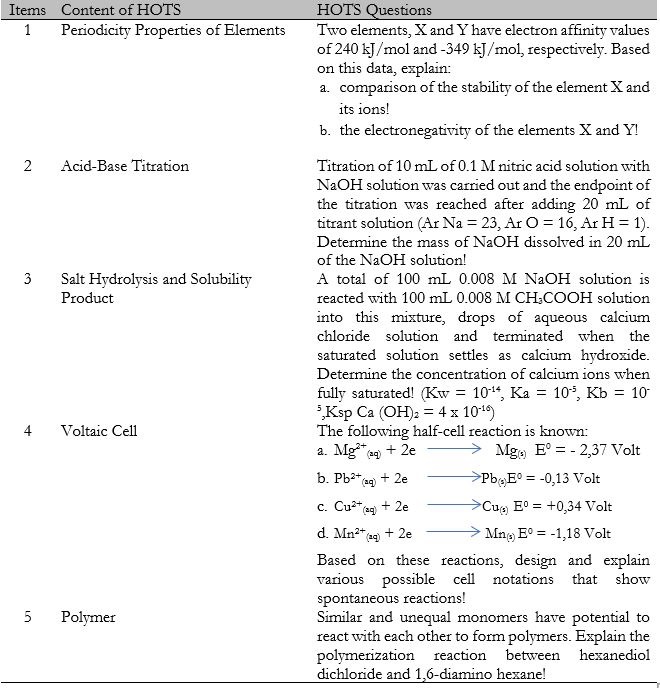
Using HOTS-Based Chemistry National Exam Questions to Map the Analytical Abilities of Senior High School Students
Abstract
References
Anderson, O. W. & Krathwohl, D. R. (2001). A taxonomy for learning, teaching, and assessing (a revision of Bloom’s taxonomy of educational objectives). Addision Wesley Longman, Inc.
Anggraini, N. P., Budiyono & Pratiwi, H. (2018). Analysis of higher order thinking skills students at junior high school in Surakarta. Journal of Physics: Conference Series, 1211(012077), 1-9.
Anwar, B. & Mumthas, N. S. (2014). Taking triarchic teaching to classrooms: Giving everybody a fair chance. International Journal of Advanced Research, 2(5), 455-458.
Areesophonpichet, S. (2013). A development of analytical thinking skills of graduate students by using concept mapping. The Asian Conference on Education, 1, 15.
Cesarandari, S., Aswandi & Oikurema. (2019). Applying the Higher Order Thinking Skills (HOTS) to spoken analytical exposition in oral presentation assessment. IOSR Journal of Research & Method in Education, 9(2), 1-5.
Changwong, K., Sukkamart, A., & Sisan, B. (2018). Critical thinking skill development: Analysis of a new learning management model for Thai high schools. Journal of International Studies, 11(2), 37-48.
Dinni, H. N. (2018). HOTS (High Order Thinking Skills) dan kaitannya dengan kemampuan literasi matematika. PRISMA, Prosiding Seminar Nasional Matematika, 1, 170-176.
Facione, P. A. (2011). Critical thinking: What it is and why it counts. Insight Assessment, 2007(1), 1-23.
Falvo, D. (2008). Animations and simulations for teaching and learning molecular chemistry. International Journal of Technology in Teaching and Learning, 4(1), 68-77.
Hadi, S., Retnawati, H., Munadi, S., Apino, E., &Wulandari, N. F. (2018). The difficulties of high school students in solving higher-order thinking skills problems. Problems of Education In The 21st Century, 76(4), 520-532.
Harta, J. (2019). Kajian kurikulum kimia SMA dan SMK. Deepublish.
Irawati, T. N. & Mahmudah, M. (2018). Pengembangan instrumen kemampuan berpikir analisis siswa smp dalam menyelesaikan soal pemecahan masalah matematika. Kadikma, 9(2), 1-11.
Irwanto, Rohaeti, E., Widjajanti, E., & Suyanta. (2017). Students’ science process skill and analytical thinking ability in chemistry learning. AIP Conference Proceedings, 1868(030001), 1-4. https://doi.org/10.1063/1.4995100
Kusuma, M. D., Rosidin, U., Abdurrahman, & Suyatna, A. (2017). The development of Higher Order Thinking Skill (HOTS) instrument assessment in physics study. Journal of Research & Method in Education, 7(1), 26-32.
Laksono, E. W., Rohaeti, E., Suyanta, & Irwanto. (2017). Instrumen penilaian kemampuan berpikir analitis dan keterampilan proses sains kimia. Jurnal Kependidikan. 1(1), 100-110.
Mahatoo, J. (2012). Scientific literacy and nature of science as it impacts on boys' achievement in South Trinidad (Doctoral dissertation).
Maulipaksi, D. (2019, March 27). Tingkat kesulitan soal UN 2019 tidak berubah, ini komposisi soalnya. Kementrian Pendidikan dan Kebudayaan. https://www.kemdikbud.go.id/main/blog/2019/03/tingkat-kesulitan-soal-un-2019-tidak-berubah-ini-komposisi-soalnya
Politsinsky, E. & Demenkova, L. (2015). The organization of the training of technical college students using practice-oriented tasks. Asian Social Science, 11(1), 187-192.
Politsinsky, E., Demenkova, L., & Medvedevа, O. (2015). Ways of students training aimed at analytical skills development while solving learning tasks. Procedia - Social and Behavioral Sciences, 206 (1), 383 – 387.
Pratama, G. S. & Retnawati, H. (2018). Urgency of Higher Order Thinking Skills (HOTS) content analysis in mathematics textbook. Journal of Physics: Conference Series, 1097 (1), 1-8. 10.1088/1742-6596/1097/1/012147
Prastiwi, M. N. B. & Laksono, E. W. (2018). The ability of analytical thinking and chemistry literacy in high school students learning. Journal of Physics: Conference Series, 1097(1), 1-8. 10.1088/1742-6596/1097/1/012061
Prawita, W., Prayitno, B. A., & Sugiyarto (2019). Effectiveness of a generative learning based biology module to improve the analytical thinking skills of the students with high and low reading motivation. International Journal of Instruction, 12(1), 1459-1476.
Probosari, R. M., Widyastuti, F., Sajidan, S., Suranoto, S., & Prayitno, B. A. (2018). Reading for tracing evidence : Developing scientific knowledge through science text. Journal of Physics: Conference Series. 1022(1), 1-6.
Saptono, S., Rustaman, N. Y., Saefudin, & Widodo, A. (2016). Memfasilitasi HOTS dalam perkuliahan biologi sel melalui model integrasi atribut asesmen formatif. Unnes Science Education Journal, 5(3), 1403-1412.
Saputra, H. (2016). Pengembangan mutu pendidikan menuju era global: Penguatan mutu pembelajaran dengan penerapan HOTS (High Order Thinking Skills). SMILE’s Publishing.
Schumacher, C., & Ifenthaler, D. (2018). Features students really expect from learning analytics. Computers in Human Behavior, 78, 397–407.
Seventika, S. Y., Sukestiyarno, Y. L., & Mariani, S. (2018). Critical thinking analysis based on Facione (2015) – Angelo (1995) logical mathematics material of vocational high school (VHS). Journal of Physics: Conf. Series, 983(1), 1-6. 10.1088/1742-6596/983/1/012067
Singaravelu, S. (2017). Problem solving ability of higher secondary chemistry students. IOSR Journal of Research & Method in Education (IOSR-JRME), 7(4), 19-22.
Sumintono, B. & Widhiarso, W. (2015). Aplikasi pemodelan rasch pada assesment pendidikan. Trim Komunikata.
Thaneerananon, T., Triampo, W., & Nokkaew, A. (2016). Development of a test to evaluate students’ analytical thinking based on fact versus opinion differentiation. International Journal of Instruction, 9(2), 123-138.
Vong, S. A., & Kaewurai, W. (2017). Instructional model development to enhance critical thinking and critical thinking teaching ability of trainee students at regional teaching training center in Takeo province, Cambodia. Kasetsart Journal of Social Sciences, 38(1), 88-95.
Winarti. (2015). Profil kemampuan berpikir analisis dan evaluasi mahasiswa dalam mengerjakan soal konsep kalor. Jurnal Inovasi dan Pembelajaran Fisika, 2(1), 19-24.
Yang, S. C., & Lin, W. C. (2004). The relationship among creative, critical thinking and thinking styles in Taiwan high school students. Journal of Instructional Psychology, 3(1), 33-45.
Yulina, I. K., Permanasari, A., Hernani, H., & Setiawan, W. (2018). Analytical thinking skill profile and perception of pre service chemistry teachers in analytical chemistry learning. Journal of Physics: Conference Series, 1157(4), 1-7. 10.1088/1742-6596/1157/4/042046
Zhang, L. F. (2003). Contributions of thinking styles to critical thinking. Journal of Psychology, 137(6), 517-544.
DOI: https://doi.org/10.17509/jsl.v3i3.22387
Refbacks
- There are currently no refbacks.
Copyright (c) 2020 Johnsen Harta, Novena Tesalonika Rasuh, Angela Seriang

This work is licensed under a Creative Commons Attribution-ShareAlike 4.0 International License.


Jl. Dr. Setiabudhi 229 Bandung 40154, West Java, Indonesia










